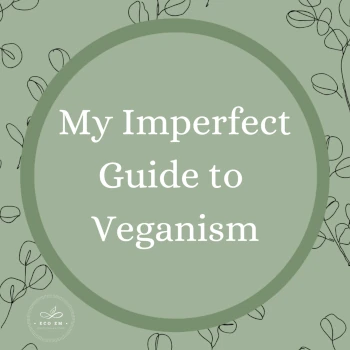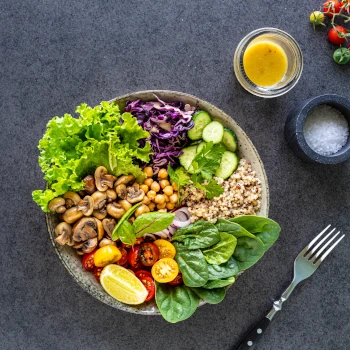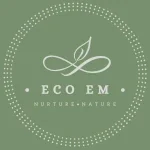My Imperfect Guide to Veganism: Unravelling the Benefits, Health Myths, and the Flexitarian Perspective
![]()
ECO EM’S BLOG
MY IMPERFECT GUIDE TO VEGANISM: UNRAVELLING THE BENEFITS, HEALTH MYTHS, AND THE FLEXITARIAN PERSPECTIVE
![]()
 Do you want to try Veganuary? Or have you been thinking about becoming a vegan for a while now? It isn’t always an easy adjustment, but it is a lifestyle choice that many people are adopting as it has many advantages. In this mini vegan guide, I’ll go over the benefits, debunk health myths, and investigate why vegans frequently feel healthier and happier. I’ll also address why eating a plant-based diet some of the time is better than not eating it all of the time, and why adopting a flexitarian mindset may be the ideal balance for many.
Do you want to try Veganuary? Or have you been thinking about becoming a vegan for a while now? It isn’t always an easy adjustment, but it is a lifestyle choice that many people are adopting as it has many advantages. In this mini vegan guide, I’ll go over the benefits, debunk health myths, and investigate why vegans frequently feel healthier and happier. I’ll also address why eating a plant-based diet some of the time is better than not eating it all of the time, and why adopting a flexitarian mindset may be the ideal balance for many.
THE BENEFITS OF BEING VEGAN:
Environmental Impact:
Veganism is more than simply a diet; it is a way of life that contributes to a healthy planet. Along with the health benefits, this was the primary reason I began to adjust my diet and started making my eco swaps. Plant-based diets have a much lower carbon footprint, lowering greenhouse gas emissions and aiding in the fight against climate change. You are helping the environment by opting to eat plants over animal products. Even David Attenborough has suggested it, so it must be a good idea.
Ethical Considerations:
 Many people choose to lead a vegan diet for ethical reasons. Avoiding animal products helps to lessen animal suffering while also addressing issues about factory farming and animal abuse. Choosing plant-based alternatives is consistent with a compassionate and cruelty-free attitude. This extends beyond eating to other aspects of your life, such as cosmetics, skincare, and clothing. Another place to start, not just your diet, is to ensure that the products you buy have not been tested on animals. You can do so by researching the brand and checking out the packaging.
Many people choose to lead a vegan diet for ethical reasons. Avoiding animal products helps to lessen animal suffering while also addressing issues about factory farming and animal abuse. Choosing plant-based alternatives is consistent with a compassionate and cruelty-free attitude. This extends beyond eating to other aspects of your life, such as cosmetics, skincare, and clothing. Another place to start, not just your diet, is to ensure that the products you buy have not been tested on animals. You can do so by researching the brand and checking out the packaging.
Health Benefits:
Contrary to popular belief, a well-balanced vegan diet can contain all the nutrients required for a healthy life. Lower cholesterol levels, a lower chance of heart disease, and improved blood sugar control are just a few of the health advantages of a plant-based diet. Choosing homegrown vegetables and deciding to grow our food is more than just being more sustainable and self-sufficient. But another important reason for starting our vegetable plot at home was to gain a better understanding of what goes into our food. To ensure they are chemical-free, where possible aim to buy organic fruit and vegetables to get even more health benefits from your food.
IS BEING VEGAN ACTUALLY HEALTHY? MY IMPERFECT GUIDE TO VEGANISM
Nutritional Considerations:
 Adopting a vegan diet requires careful planning to ensure adequate nutrition, such as vitamin B12, iron, calcium, and omega-3 fatty acids. While these nutrients are largely found in animal products, plant-based alternatives and supplements can assist in filling the void. A well-planned vegan diet can be as nutritious as, if not more so than, an omnivorous one. I’ve replaced most of our food with fruit and vegetables, but we make up a large portion of our protein with legumes, green vegetables and lentils.
Adopting a vegan diet requires careful planning to ensure adequate nutrition, such as vitamin B12, iron, calcium, and omega-3 fatty acids. While these nutrients are largely found in animal products, plant-based alternatives and supplements can assist in filling the void. A well-planned vegan diet can be as nutritious as, if not more so than, an omnivorous one. I’ve replaced most of our food with fruit and vegetables, but we make up a large portion of our protein with legumes, green vegetables and lentils.
Balanced Diet:
Balance is essential in any diet. A vegan diet rich in complete, nutrient-dense foods including fruits, vegetables, legumes, nuts, and seeds can be extremely beneficial. However, relying extensively on processed vegan substitutes may not provide the same advantages. To optimise nutritional intake, it is critical to prioritise whole foods, which is something we are still working on! When we first started there were so many easy swaps, and we took the opportunity to try everything. As we’re in a new year, a big goal for this year is to reduce our consumption of substitutes and processed food. For example, opting for a cauliflower steak rather than a processed non-meat steak substitute from the supermarket.
WHY DO VEGANS FEEL BETTER?
Increased Energy:
Many people report having more energy after switching to a vegan diet. The abundance of complex carbohydrates in plant-based diets provides a steady flow of energy, avoiding the peaks and crashes associated with processed meals. I, for one, have seen a decrease in mid-afternoon crashes and a general improvement in overall health throughout the year, with fewer colds and illnesses in the house.
Digestive Health:
A fibre-rich plant-based diet promotes intestinal health. Increased fibre consumption promotes gut health and prevents constipation by facilitating regular bowel movements. It has also been connected to helping people suffering from IBS and other digestive issues.
WHY ARE VEGANS HAPPIER? MY IMPERFECT GUIDE TO VEGANISM
Conscious Living:
Knowing that your lifestyle choices correspond to your ideals can provide a sense of contentment and happiness. Many vegans believe that living compassionately and sustainably contributes to a general sense of well-being. Knowing that we are making a positive difference and trying to do good is fulfilling.
Being a part of the thriving vegan community gives a sense of belonging and support. Sharing recipes, tips, and experiences with like-minded people can strengthen your social circles and lead to a happier life. The Vegan Festivals and Markets I’ve attended have helped me create some excellent friends and connections with others who are also trying to spread the word about their businesses. Everyone I’ve met has been really welcoming and wanted to learn more about the full product range.
The Flexitarian Perspective:
We understand that transitioning to a vegan diet overnight might be difficult; however, taking a flexitarian approach allows for a more gradual adjustment. Over time, incorporating more plant-based meals makes the transition easier. Even if it’s just one meal a week or not drinking milk in the first instance. It’s constantly changing in our house, and it’s taken some time and mistakes to get it right. We’re far from perfect and still to date eat things that are vegetarian rather than vegan, but we’ve come such a long way in a year. And the best bit is we’re still learning.
A flexitarian diet is a viable alternative for people who find it difficult to commit totally to veganism. When possible, choosing plant-based options adds to health, environmental, and ethical goals. And even if you just go 75%, that’s still better than nothing.
To summarise, adopting a vegan lifestyle is a personal journey full of changes and challenges. The goal is to discover a balance that works for you, whether you’re fully committed, leaning towards flexitarianism, or just exploring the options. Remember that every plant-based choice, no matter how tiny, contributes to a healthy self and a better world as you travel the imperfect route to veganism.
If you’d like to learn more or have a chat, please get in touch, I’d love to hear from you. On the 27th and 28th of January, I’ll also be at the Vegan Festival at FarGo Coventry. I look forward to seeing you there.
Thank you for reading this weeks blog, My Imperfect Guide to Veganism: Unravelling the Benefits, Health Myths, and the Flexitarian Perspective.
Peace and love
Eco Em xx
